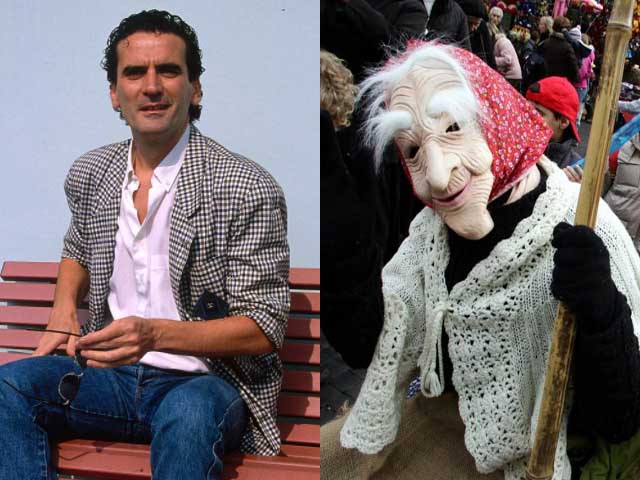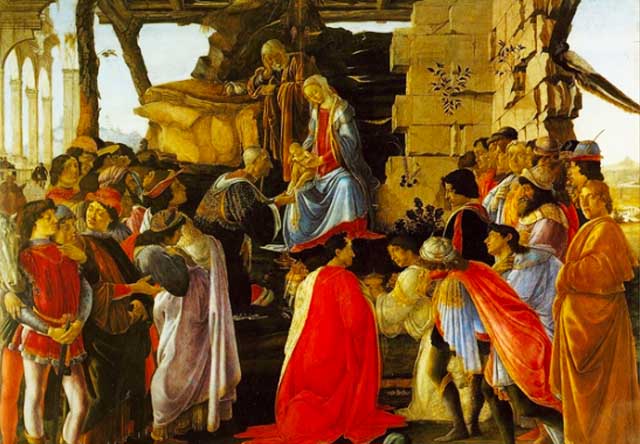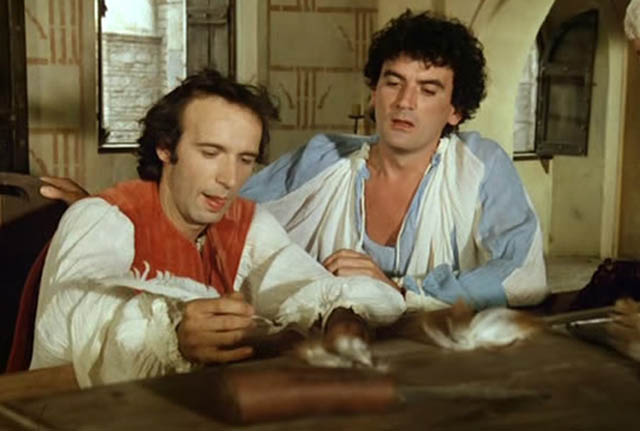
Il 6 gennaio, nella tradizione cristiana, è il giorno dell’Epifania, il giorno in cui Gesù Bambino si fu trovato da tre re Magi che erano arrivati a Betlemme per vederlo. In Italia è anche la festa della Befana. La notte delle 5 lei passa dalle case e porta regali a tutti i bravi bambini e un pezzo di carbone ai cattivi. Ecco la storiella:
On January 6th, in the Christian tradition, it is the Epiphany, the day in which baby Jesus was discovered by the three Magi who had traveled to Bethlehem to find him. In Italy, it is also the day of the Befana. The night of the fifth she passes from house to house bringing gifts to the good little girls and boys and lumps of coal to the bad ones. Here’s the story:

La figura della Befana potrebbe infatti prendere spunto dalla vecchietta a cui i tre re Magi si erano rivolti per avere indicazioni sulla strada per raggiungere Betlemme dove volevano vedere Gesù Bambino. La vecchietta si era rifiutata di aiutarli e i re Magi erano partiti da soli. Il giorno dopo però, pentita di aver perso l’occasione di vedere Gesù, la vecchietta li aveva seguiti senza però più riuscire a trovare il bambinello. Per questo adesso il 6 gennaio passa in tutte le case a portare regali ai bambini.
The story of the Befana may spring from the legend of the old woman who spurned the Magi, refusing to help them find the baby Jesus. The Magi left by themselves to continue their journey alone. The next day the old woman regretted not having helped them, so she began to follow them. In her search for the baby as she passed by homes of children she gave them presents to make up for her bad behavior, thus redeeming herself.
Ma nonostante le buone intenzioni della Befana riformata, ancora non tutti hanno un bel rapporto con lei. Ascoltate Massimo Troisi che racconta perché le cose sono andate storte tra loro. Non preoccupatevi se trovate il discorso di Troisi un po’ difficile da seguire. Lui è famoso per il suo modo di parlare e il suo accento napoletano. Cercate di capire quello che dice in quest’intervista con Pippo Baudo: “La befana delle ferrovie che portava sempre i trenini elettrici!”
But despite the good intentions of the reformed Befana, not everyone has a great relationship with her. Listen to Massimo Troisi as he tells us why things went very badly between him and the Befana. Don’t worry too much if you find the speech of Troisi a little difficult to follow. He is famous for his way of speaking and his difficult Neopolitan accent. Try to understand what he says in this interview with Pippo Baudo: “The Befana of the railways that always brought electric trains.”
E adesso un po’ di pratica. Ecco alcune cose che stavo rimuginando nel mese di dicembre.
Un regalo dalla Befana ed io!
Un po’ di pratica con il congiuntivo
• Prima che (before) – Takes the subjunctive – just accept it and move on! “La guerra scoppiò prima che Giorgio ritornasse.“
Other words needing subjective:
• Benché, Sebbene, Malgrado, Nonostante, Quantunque (all meaning: although, in spite of, even though, even if)
• Purché, A patto che, A condizione che (all meaning: provided that)
• Nel caso che (in case)
• Affinché, Cosicché, In modo che (all meaning: so that, in order that)
• Senza che (without)
Parole simili, che non richiedono il congiuntivo:
• Bensì = “ma”, “invece”, “however”
• Finché = as long as, until = “Puoi dormire finché vuoi” or “Tutto andava bene finché cominciò a piovere.”
• Finche non = not until, “Tutto andava bene finché non cominciò a piovere”.
Parole simili:
• è svanito (svanire) = disappear
• è svenuto (svenire) = faint
• la tovaglia = table cloth
• il tovagliolo = napkin
• Rimorso = remorse (for something that you did) Il rimorso è un’emozione sperimentata da chi ritiene di aver tenuto azioni o comportamenti contrari al proprio codice morale. Il rimorso produce il senso di colpa.
• Rimpianto = regret (for something you didn’t do) Il rimpianto è una reazione negativa, conscia ed emotiva ad azioni e comportamenti compiuti nel passato.
Quando si parla degli incidenti si usano queste parole (spero che non sia necessario!)
• Travolgere = trascinare, crush, overwhelm “L’ondata di piena ha travolto diverse auto” (the giant wave devasted several cars) “Anna fu travolta da un’ondata di ricordi.” “L’auto su cui viaggiava era stata travolta da ubriaco”
• Investire = run over, knock down (colpire con violenza) “La macchina l’ha investito proprio qui davanti”
Quando si usa “per la maggior parte”
• Per la maggior parte = for the most part (si usa per i casi o le cose – things you can count) “Per la maggior parte, i disastri sono dovuti all’incompetenza del governo.” For the most part the disasters are the result of the government’s incompetence.
• Principalmente = mainly (things you can’t really count) “Principalmente sono autodittata. I am mostly self taught in the Italian language.”
Un altro modo per usare “venire”
• La torta va cotta per venti minuti = la torta deve essere cotta per venti minuti
Parole/espressione interessanti
• Ogni tanto = Di tanto in tanto = occasionalmente = occasionally, now and then
• Chincaglieria = bauble
• Ben consumato = well used
• Fatto/a IN casa = home made











Melissa,grazie per il regalo davvero utile, anche perché durante le feste non ho imparato molto.Però vorrei condividere con te una bella espressione che ho sentito:” peccati di gola.”Penso che così si chiamino anche le leccornie che ci stai mostrando OGNI TANTO 🙂
P.S.”Don Matteo” is back! Wow!
Buona Befana Leo! Mi piace l’espressione “peccati di gola” perfetta per noi golosi!
Ieri sera mio marito ha trovato Don Matteo su un canale locale di San Francisco! Abbiamo guardato una puntata! 🙂 sul canale 917 KCSM ( http://kcsm.org/tv/ ) ci sono alcuni programmi italiani tra cui c’è Detective Montalbano. Si può anche trovare le puntate vecchie di Don Mateo sul sito di RAI.tv (ma alcune di loro non si possono vedere per ragione di “Copyright infringement” – che c’è! uffa!)
( http://www.rai.tv/dl/RaiTV/programmi/page/Page-f558c4d9-e148-4fb5-a299-1a6ef731fa3c.html )